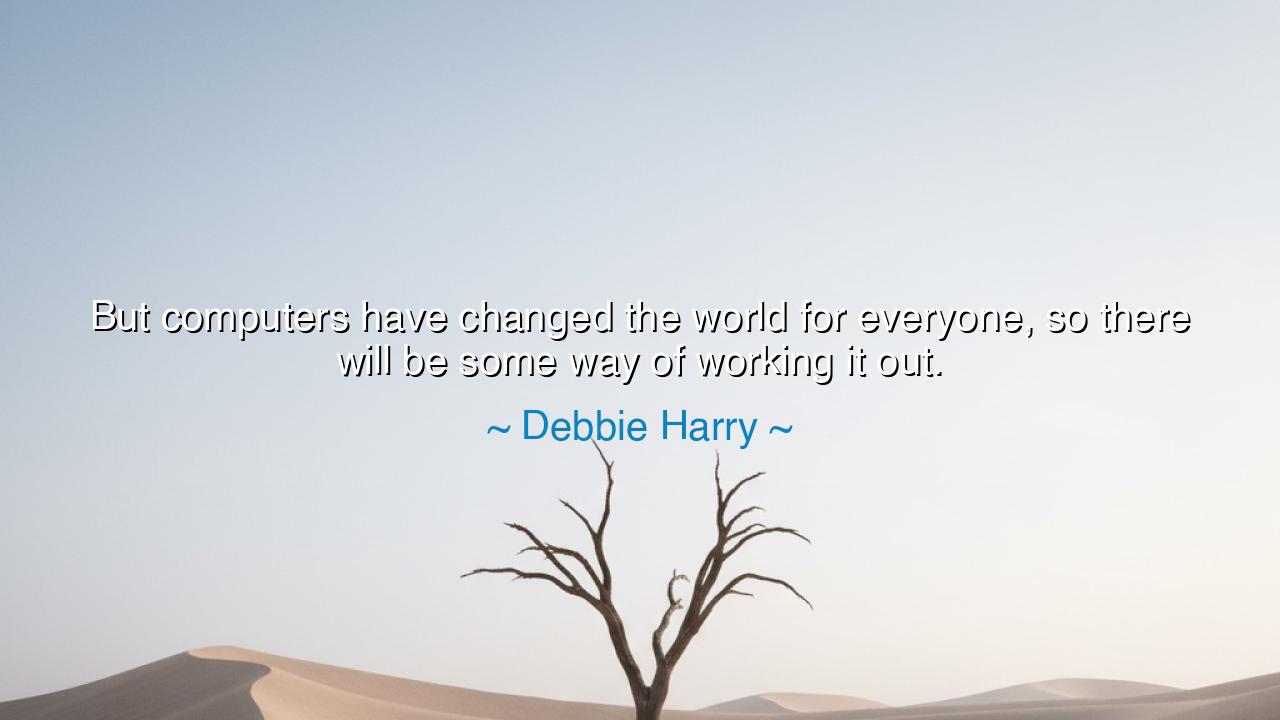
But computers have changed the world for everyone, so there will
But computers have changed the world for everyone, so there will be some way of working it out.






In the vast and unfolding narrative of human progress, there is a truth that stands out, as ancient as the very invention of tools themselves. Debbie Harry, with her characteristic clarity and insight, once said, “But computers have changed the world for everyone, so there will be some way of working it out.” At first glance, this may seem like a mere observation on the rise of technology, but within it lies a deeper wisdom—one that speaks to the universal nature of human adaptability, the indomitable will to navigate the challenges of an ever-evolving world. Harry’s words echo the timeless truth that humanity has always faced change, and with each transformation, we have found ways to not only survive, but to thrive.
In the ancient world, change often came through conquest, discovery, or the unraveling of knowledge. The Greeks, with their restless pursuit of understanding, were always at the edge of philosophical and scientific discovery. Archimedes, for instance, saw the laws of nature through the lens of mathematics and physics, applying them to inventions that changed the way the world operated. But even Archimedes had to adapt to the evolving world around him. He didn’t cling to the old ways but sought new truths that would unlock the potential of the universe. Just as the ancient world embraced new tools and ideas, so too has the modern world embraced the computer, a tool that has reshaped not just the way we work, but the very fabric of human existence.
Similarly, consider the rise of the Roman Empire, where the Romans built not just roads and aqueducts, but a network of knowledge and communication that connected distant parts of the empire. They saw the potential in engineering and organization, and in doing so, they brought together a vast, diverse world. Yet, they also had to adapt to the changing demands of their empire. When the empire began to fragment, the Romans didn’t rely solely on their past glories. Instead, they sought new ways to organize, communicate, and expand, much like we do today in our digital age. The lesson here is clear: change is inevitable, but adaptation is the key to survival and growth.
The computer revolution is the modern equivalent of the forces of change that shaped the ancient world. What once seemed like an insurmountable challenge has become an opportunity. Computers, like the tools of the past, have opened up new avenues for exploration and expression. Yet, like the ancient philosophers and scientists, we are still learning to harness their full potential. Just as Archimedes used his tools to push the boundaries of what was possible, so too must we use technology to elevate humanity. We must see the computer not as a hindrance, but as a tool for expanding the mind, for exploring the unknown, and for solving the problems that arise with every new discovery.
Harry’s statement also speaks to the uniqueness of the human spirit. Computers have fundamentally altered the way we live, work, and relate to one another, but it is our ability to adapt to these changes that defines us. The ancient Stoics, like Marcus Aurelius, taught us that while we cannot control the forces of nature or fate, we can control our response to them. In the face of new challenges, we have the power to reshape our world. Just as the Stoics remained calm and resolute in the face of adversity, so must we navigate the digital age with the same steadfastness, harnessing the power of technology to serve humanity rather than overwhelm it.
The lesson from Harry’s words, and from the stories of the ancients, is one of empowerment. When faced with a world changing at an accelerating rate, it is easy to feel powerless, overwhelmed by the complexity and uncertainty of it all. But the key is not to resist the change, but to embrace it, to find ways to use it to our advantage. As we did in ancient times, we must approach new challenges with the same curiosity, innovation, and determination that has allowed us to overcome so many obstacles in the past. We must adapt to the digital age with the same spirit of discovery that led to the inventions of the wheel, the printing press, and the steam engine.
In practical terms, the action we can take is to engage with technology actively and thoughtfully. Instead of allowing computers and digital tools to dictate our lives, we must learn to harness them to expand our capabilities. Like the great thinkers and innovators of the past, we must use these tools not just to consume, but to create. Whether in education, business, or personal growth, the challenge is to adapt to the new world without losing sight of the timeless values that have always guided us: curiosity, integrity, and the constant drive to improve. Just as the ancients embraced new tools and new ways of thinking, so too must we embrace the computer as a means of enriching the human experience and creating a better future for all.
Thus, the practical action we must take is clear: we must not shy away from the change that computers have brought, but actively engage with them, using their vast potential to enhance our lives and solve the complex problems of the modern world. Just as Plato sought wisdom through dialogue, and Archimedes through invention, so must we seek solutions through our own understanding of technology. In this way, we will not simply survive the digital age but thrive within it, shaping a future where human intelligence and technology work together, not in opposition, but in partnership.






AAdministratorAdministrator
Welcome, honored guests. Please leave a comment, we will respond soon